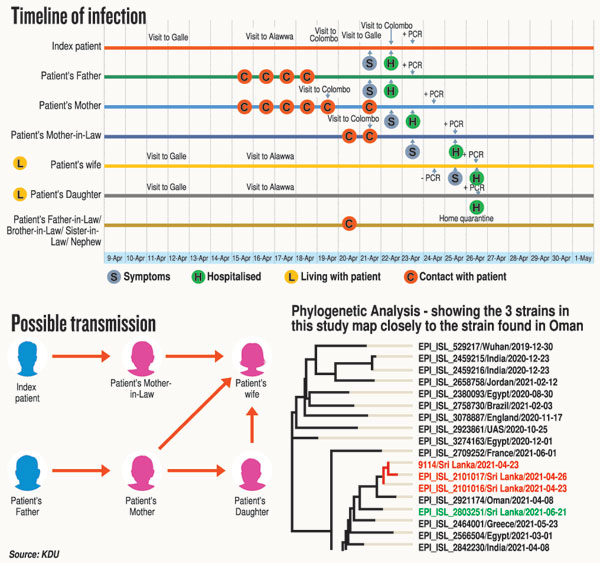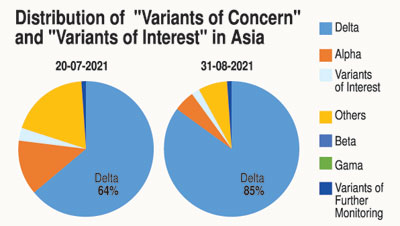News
COVID-hit family in April infected by strain in Egypt, KDU study reveals

The RT-PCR laboratory of the KDU Hospital
A family of six including a two-year-old girl falls like dominoes in the face of the onslaught of COVID-19, just before and soon after the New Year this April.
Was it the Delta variant that was gaining dominance, surpassing all others in early April?
It was not so in the case of this family, a diligent study initiated by the Kotelawala Defence University (KDU) had found.
The family had been admitted to KDU Hospital for monitoring under Consultant Physicians Dr. Dumitha Govindapala and Dr. Priyamali Jayasekera.
The unusual activity within this family had caught the interest of the KDU researchers and the study had been initiated by Dr. Dharshan De Silva, with the data/information being collected by Technical Officer Harshi Abeygoonawardena.
Extensive analysis of the data had also been carried out by Ms. Abeygoonawardena with the support of Dr. Himali Jayasinghearachchi (KDU-CARE) and Dr. Thamarasi Senaratne (Allied Health Science Faculty). The other team members had included Dr. Dilini Nakkawita, Dr. Nasmiya Mubarak, Upeksha Kulasekera and Pawani Kawyangana, while the sequencing of the samples had been performed at Genelabs Medical (Pvt) Ltd.
The trail of this mutant begins with a 36-year-old living with his wife (36) and daughter (2) in Mount Lavinia but working in Colombo and Galle. The mutant unidentified until then, hits two of the family and then the others one by one.
Life was routine but busy for this family and there was a break for the New Year………and so, the man, his wife and daughter bundle themselves into their car and head south to Galle on April 9 to spend Avurudu with the in-laws (the wife’s father and mother). Then they head back on April 15 but not to their home in Mount Lavinia but to Alawwa.
It is on April 19 (Monday) that the family returns home to Mount Lavinia. They are accompanied by the man’s mother. The very next day, April 20 (Tuesday), he heads down to Galle again for work and returns on April 21 (Wednesday), this time accompanied by his wife’s mother who would look after the little one, releasing his own mother to return to Alawwa. That night itself, he drops his mother-in-law at his home, picks up his mother and heads for Alawwa, popping two paracetamols as he feels feverish.
The next day, April 22 (Thursday), he is unwell and so is his father. It is then that they make their way from Alawwa to the KDU Hospital for testing. Rapid Antigen Tests turn positive and both are admitted to the KDU Hospital.
By April 23 (Friday) his Amma too is feeling ill with a sore throat and gets admitted to the same hospital, while his mother-in-law and his wife and daughter suffer the same fate, seeking admission on April 24 (Sunday) and April 25 (Monday) respectively.

“This unusual activity of many members of one family falling victim to COVID-19 sparked our interest and we decided to get the samples sequenced, so that we could analyze the raw data,” says Dr. De Silva.
A surprise awaited the team – the phylogenetic analysis threw up an interesting finding. The virus mutant which had infected this family of six was not the one doing the rounds at that time.
Dr. De Silva says that it was of the C.36 lineage, which had a dominant mutation in the spike protein (L452R). This strain had originated in Egypt and is believed to have slipped into Sri Lanka from Oman in West Asia.
With this finding also came a major worry, for this strain was similar to the strain spreading rapidly in California, United States of America…….so the KDU study team immediately notified the Health and Defence Ministries to enable further investigation.
How had this family got exposed to this strain? They had no contact with any arrivals from abroad. The whole family had no other travel history; they had not used public transport, only their own vehicle; and they had stayed home. The parents in Alawwa had a coconut estate with only the father visiting it.
“Even though this mutant was more transmissible than the original virus doing the rounds in Sri Lanka at that time, luckily it did not create a cluster,” says Dr. De Silva with relief.
In June, just two infections from the same variant had been detected in Vavuniya by other scientists.


